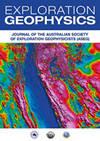用于势场数据的幅度平衡边缘检测滤波器
IF 0.8
4区 地球科学
Q4 GEOCHEMISTRY & GEOPHYSICS
引用次数: 1
摘要
自动增益控制(AGC)滤波器通常应用于势场数据,以产生大幅度和小幅度特征都变得突出的图像。这些滤波器通常基于数据的导数(或希尔伯特变换)的比率,因此对噪声敏感。通过利用数据具有振幅和相位分量的事实,可以产生具有最小噪声问题的边缘增强数据集。这些过滤器在合成数据和南非的数据集上进行了演示。本文章由计算机程序翻译,如有差异,请以英文原文为准。
Amplitude-balanced edge detection filters for potential field data
Automatic gain control (AGC) filters are commonly applied to potential field data to produce images where both large and small amplitude features become prominent. These filters are usually based on ratios of the derivatives (or Hilbert transforms) of the data and are sensitive to noise as a result. By exploiting the fact that the data has an amplitude and phase component it is possible to produce an edge-enhanced dataset with minimal noise issues. The filters are demonstrated on synthetic data and on datasets from South Africa.
求助全文
通过发布文献求助,成功后即可免费获取论文全文。
去求助
来源期刊

Exploration Geophysics
地学-地球化学与地球物理
CiteScore
2.30
自引率
0.00%
发文量
33
审稿时长
>12 weeks
期刊介绍:
Exploration Geophysics is published on behalf of the Australian Society of Exploration Geophysicists (ASEG), Society of Exploration Geophysics of Japan (SEGJ), and Korean Society of Earth and Exploration Geophysicists (KSEG).
The journal presents significant case histories, advances in data interpretation, and theoretical developments resulting from original research in exploration and applied geophysics. Papers that may have implications for field practice in Australia, even if they report work from other continents, will be welcome. ´Exploration and applied geophysics´ will be interpreted broadly by the editors, so that geotechnical and environmental studies are by no means precluded.
Papers are expected to be of a high standard. Exploration Geophysics uses an international pool of reviewers drawn from industry and academic authorities as selected by the editorial panel.
The journal provides a common meeting ground for geophysicists active in either field studies or basic research.
 求助内容:
求助内容: 应助结果提醒方式:
应助结果提醒方式:


